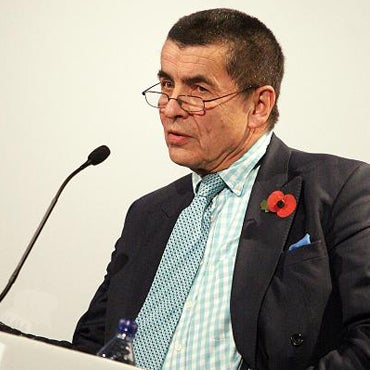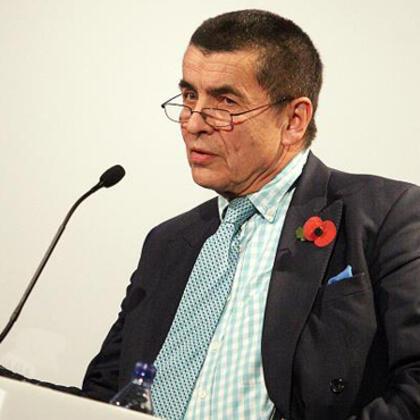Advocacy – ‘as if’ the Person Represented, or ‘for’ the Person Represented?
Share
- Details
- Transcript
- Audio
- Downloads
- Extra Reading
UK lawyers used to think that advocacy was a God–given art. In the last 20 years – not more - they have discovered how to train advocacy, applying skills acquired from jurisdictions around the world. Analysis of how advocacy really works benefits from looking back at earlier periods, and then looking forward to today and beyond asking whether advocacy is for establishing the truth and whether the advocate is as if the person represented or simply advocating to win on the client’s behalf at almost any cost. This lecture may include practical demonstrations of examples of advocacy and may involve active engagement with the audience – if willing!
Download Transcript
05 March 2014
Advocacy: ‘As if’ the person represented or ‘For’ the person represented?
Sir Geoffrey Nice QC
Over the last couple of decades, no more, UK lawyers think they have discovered how to train advocacy, applying training skills they picked up from jurisdictions around the world that were less inclined to think advocacy was simply a God-given art. Analysis of advocacy benefits from looking back at earlier periods – Cicero and since - and then to look forward asking whether advocacy is for the person represented or simply to win on behalf of the person represented at almost any cost. And would that be fair? In this lecture there may be practical demonstrations of a few examples of advocacy - and an interactive element, but only for any who are willing. 43 years ago, when I was called to the Bar, barristers had a near complete monopoly of rights of audience in higher courts of England and Wales. They received almost no training in the art – if it is - of advocacy, a skill it was assumed came from god or arrived in some osmotic way simply from being with someone who could then be described, without political ticklishness, as a ‘pupil master’ – almost always a man and probably described as a ‘master’ even when a woman. And that Master would himself have had no training in advocacy or even in how to teach or train his – very occasionally her – pupil in advocacy or anything else. At Bar School there may have been one or two practical sessions with pretend witnesses, but no explanation of what advocacy was and certainly nothing remotely memorable about the skill we were to develop and by which we were to earn our living for the rest of our lives. Things are very different now, as I will explain. On being called to the Bar (in my case by the Inner Temple) we were handed two very slim volumes. The first book, published in 1933, was thought suitable for 1971 barristers. It spoke of the value to the public in many spheres of the barrister’s ability to sort out facts but on the subject of cross examination, the exercise by which it is sometimes thought facts may be established, said helpfully: ‘I regard it as almost impossible to give much help or advice with regard to cross examination’…. Observing, nevertheless, that: ‘It is personality that counts; it is the personality of the advocate, having the material, which enables him the more readily to expose the untruthfulness of a witness'. The same book, it should be noted, remarked on how one barrister had spent many, many days on poor persons cases ‘not just for the sake of experience’. Good to know the spirit of pro bono work was already alive – even if the author sounded surprised that someone should work, pro bono, for little or nothing. That apart the book contained nothing about the art of being an advocate and, indeed, said nothing about the skill beyond advising against cross examining at too great length and in favour of not equating cross examination with examining crossly (Ho Ho). The same lecture contains a fascinating passage about the good practice of seeing the client before the case starts (it was still the practice of many advocates to refuse to see the client and to communicate with him, if at all, through the solicitor). It explained the position of the barrister advocate’s client and his case thus: ‘It may be that he understand little about it…..but it is his case and he likes to see Counsel and to know that Counsel is taking a personal interest in the matter………..The client likes to hear the discussion between between solicitor and counsel; indeed he may have some useful ideas himself, but whether he has or not he likes to meet the man who is to conduct his case, and even if nothing more important than the weather is discussed he is pleased to have the opportunity of seeing him on whose advocacy he depends'. Later: The greatest safeguard against revolution, riot and the like is that the public should have confidence in judicial tribunals and in their decisions…….’And let me remind you of the words of Lord Brougham “Conduct without eloquence is safer to trust to for success that eloquence without conduct” The last point is worth remembering; but otherwise, not much to learn. But lawyers of every period, including the period of he who wrote this little book, has produced great advocates, sometimes memorable as famous advocates even if they did not understand the skill they deployed in the way we now do, apparently. The later 1970 tome – had nothing to say about advocacy beyond giving a few rules about what should not be asked in cross examination – questions only intended to annoy the witness, for example. The content did refer to advocacy and advocates, but in the context of behaviour and ethics of the barrister as advocate. The business of being an advocate – whatever that might be – was otherwise rather taken for granted with the rest was focused on various rules relating to fees, restrictive practices that still existed, contact with witnesses, advertising (don’t) etc. Those two books were what we got as training for advocacy. I learned from my Pupil Master as he had learned from his. But he had little ability to explain what he was doing or why. I thought he was very good at what he did and imitated him. And I still think he was. The system, however out of date it may be made to sound produced capable and, periodically, brilliant advocates as it had done since the adversarial system of law first came into being. Twenty years later various vectors had operated on the leaders of the Bar and on the Inns of which barristers had to be members. They needed to be seen to be doing something for the profession they led apart from teaching newcomers to eat and drink at Inns of Court and wear tailor-made 3 piece suits. From former colonies – Australia and the USA – had come a disturbing suggestion: that advocacy was in fact a trainable skill, not unlike a sporting skill. For several years senior UK barristers, respected abroad for their special courtroom skills, went to work on overseas advocacy courses. The barristers delighted in the free 2nd class travel to Florida and elsewhere and pocketed very modest stipends but suppressed from their UK colleagues what they must have been learning and allowed the Bar to believe it didn’t need to be trained in what it obviously knew already. Such training courses were not for us. After a time that dam of arrogance broke and - catching up with Australians and Americans - the leaders of Bar of England and Wales became zealots in everything to do with advocacy training, as if they had invented it and had found the tablets of stone hiding under some ancient shire hall where juries and judges had convicted and sentenced the innocent and guilty to death by hanging for centuries. I got a chance to go to Florida before this little revolution and was amazed at what a little training could teach me about how wrong and, occasionally, right I had been in what I had been doing untutored. Once advocacy training took flight in England, I got involved and trained advocacy here and in America and Africa for the next two decades. The four Inns of Court trained and trained, as did the Circuits of the Bar and individual sets of chambers and everyone else, even solicitors. Judges or senior barristers, often with no flair for teaching or training, were pressed into becoming trainers, sometimes to the increasing redness of their faces as they tried to demonstrate what they had learned from a training manual not from within themselves. The legal profession seems to have hoped - as Cicero said: that ‘Constant practice devoted to one subject often outdoes both intelligence and skill.’ - Assiduus usus uni rei deditus et ingenium et artem saepe vincit. Was he right in what he said 2000 years ago for what we do now? By last year I had had enough and decided to rest. Partly because it was time for others to do what I had been doing. Partly because I had begun to wonder whether what we were doing was enough or appropriate for a modern age. Partly, indeed, because I wondered whether well-intentioned training in the training method we had borrowed from America and Australia might sometimes deprive the public of the brilliance some potential advocates might have been able to provide (as they used to in the past) specifically because they were not homogenized - like milk - by such training. Homogenised milk, it will be recalled, so mixed the thick cream with the thinner milk that the thick cream could never rise and never be tasted. Partly – perhaps substantially, because I was not really sure the system of adversarial justice we export around the world - trumpeting its virtues - is what any society should be wanting today. So, two distinct questions to have in mind today: First, is the adversarial legal system as good as we say it is? Second, if it is, how should advocates be trained to do it? How should you – the citizen who may need a lawyer, or the juror or magistrate or judge dealing with advocates – appreciate or appraise the skill before your eyes that may well be designed to deceive you? Are there some universal rules for advocates that should be followed? Of this second question a little more when we – Sarah Clarke and I - will explain in a couple of sentences all that you need to know today to be a trained advocate. As my last introductory observation note that ‘advocacy’ as a word may now fill a bigger role than it used to. Not only does it describe the work of barristers and solicitors – and clerks or various kinds – who have rights of audience in courts and tribunals and who are referred to as advocates, but businesses and NGOs have ‘advocates’ or ‘advocacy officers’. Is this advocacy the same activity as that of the court room advocate? Has the use of the word become imprecise? Or has the business of advocacy actually expanded? What, for example, of John Humphries and Jeremy Paxman, comparatively recent media types? Are they doing something that almost merits the terms advocacy, advocacy for the skeptical citizen? Subjecting Society’s leaders to a non-reverential interview technique probably developed from no earlier than Robin Day’s interview with Prime Minister MacMillan in 1958 and did not reach its present shape until a couple of decades later. Does the advocate in court recognise this, in his presentation / advocacy, he mirrors – and should mirror - Humphries and Paxman more than, say, Socrates or Cicero or even the famous Barrister Marshall Hall, to whom we should now turn to discover what advocacy may have been and what general rules can be discerned from how advocacy has been performed in different ages and places] Legal systems have existed for at least some 3,800 years since the time of the Babylonian King Hammurabi some 1800 years before Christ, whose laws were enforced by judges but without use, it seems, of the services of advocates. The sophists of ancient Athens were probably the first who existed as a class of people considered to be ‘lawyers’. But Athenian law required citizens to plead their own cases and disallowed anyone from exacting a fee to plead for someone else. Both rules restricted the use of advocates. Socrates was, apparently, capable of great oratory and advocacy. It was said to and of him – perhaps with devious intent but nevertheless accurately –that : ‘When we listen to you, or to someone using your arguments, even if he’s a hopeless speaker, we’re overwhelmed and carried away…………’ When defending himself, however, in front of 500 fellow Athenians many of whom were working men he maintained the arrogant tone and superiority that was in part the subject of complaint. And although Socrates said something about himself and his family he did not go as far as might have been expected of him by his fellow citizens in seeking a sympathetic decision based on personal circumstances. He thus overlooked a first basic rule for any advocate – to know your audience and to respect them. The men of Athens voted narrowly for conviction but with a greater majority for death. In Rome in the reign of the Emperor Claudius in the first century A.D. oratory was considered a great art in disseminating knowledge and promoting oneself at political elections. Cicero was neither a patrician nor a plebeian noble; his rise to political office despite his relatively humble origins has been attributed to his brilliance as an orator in a society that did allow an advocate to represent others. Cicero took on Quintus Hortensius Hortalus who was known as the best lawyer in Rome in the prosecution for corruption and maladministration in Sicily of its Propraetor (Governor) Gaius Verres. Examples of his advocacy can be felt’ even in translation: One such example is found in the speech Against Verres I, where he states "with you on this bench, gentlemen, with Marcus Acilius Glabrio as your president, I do not understand what Verres can hope to achieve". And at another point; But if you, being the judge, shall appear to be no protection to a desolate and helpless condition against power and influence; if before this tribunal the cause is found to depend on interest, not on truth; then indeed there is nothing any longer holy and uncontaminated in the state, no hope that the firmness and virtue of the judge may counterbalance the lowly condition of any one. But undoubtedly before you and your colleagues truth will prevail, or else, if it be driven from this place by power and influence, it will not be able to find any place where it can stand. He was courageous and, as other records show, a master of detail. To be master of detail is a second universal rule of good advocacy. So we may have two fundamental rules by which to train advocates – advocates of anything: know your facts and respect your audience. Do we need more? Other advocates followed Cicero and by the late fourth century a true legal profession had taken shape, dedicated to the study and practice of law, with regulations and standards in place for guidance. But these historical examples should not allow an easy assumption that the English adversarial system is of long standing It isn’t, although those countries using it are want to make it sound as though it has been in the present form for a very long time. In England and Wales justice was for long enough local in the hands of the local gentry who had immense power – including of life and death - that they did not want to see disappear. There were royal courts as well but no true centralization of justice. There was no expectation that defendants would be represented by any advocate and the prosecution in a criminal case had to be brought personally by the victim, if he could afford to, while the defendant was unrepresented on the basis that - if innocent - his untutored answers would lead to acquittal. These were confrontational ‘altercation’ trials which in the 16th century were little more than swearing matches between prosecutor and defender, often with historical elements of blood feuds that were dangerous for any just verdict and truly draconian punishments. In the following century –in 1670 and before events critical to the development of the adversarial trial unfolded - two rather important trials happened at the Old Bailey, the Trial of Penn and Mead and then the trial of the jurors who tried them. Article 39 of the Magna Carta can be regarded as the foundation of the modern concept of the right to a trial by jury : "No free man shall be captured, and or imprisoned, or disseised of his freehold, and or of his liberties, or of his free customs, or be outlawed, or exiled, or in any way destroyed, nor will we proceed against him by force or proceed against him by arms, but by the lawful judgment of his peers, and or by the law of the land." William Penn & William Mead, two Quakers charged with unlawful assembly had been arrested in August 1670 for violating the Conventicle Act, which forbade religious assemblies of more than five people outside the auspices of the Church of England. The jury found the two "guilty of speaking in Gracechurch Street" but refused to add to their verdict the words "to an unlawful / tumultous assembly". The judge refused to accept a not guilty verdict, and directed that they must return "a verdict that the court will accept, and you shall be locked up without meat, drink, fire, and tobacco....We will have a verdict by the help of God or you will starve for it." The judge had them locked up overnight without food, water or heat. Penn protested this and the judge ordered him bound and gagged (it is not known whether this order was carried out). Finally, after a two-day fast, the jury returned a not guilty verdict. he judge fined the jury for returning a verdict contrary to their own findings of fact. Penn protested that this violated the laws of the Magna Carta and was forcibly removed from the court. The judge found the jury in contempt of court and removed them to prison. Edward Bushel, a member of the jury, nonetheless refused to pay the fine to effect his release. Bushel petitioned the Court of Common Pleas for a writ of habeas corpus. Sir John Vaughan, Chief Justice of the Court of Common Pleas. The principle of this trial has survived through all the developments to follow in many cases including the 1985 Clive Ponting case where a civil servant working in the Ministry of Defence saw documents showing the Government of Mrs Thatcher may have lied about the sinking of the ship "General Belgrano" during the Falklands War and he gave copies of these documents to an opposition MP so that the matter could be raised in Parliament and was charged under the Official Secrets Act. At his trial and despite the judge's clear direction that Ponting's conduct did amount to an offence, the jury acquitted him. In Randle and Pottle in 1991 the defendants who had assisted a famous spy, George Blake, to escape from prison wrote a book about the escape. They argued a their trial for assisting the escape that their actions were justified because of the severity of Blake's sentence. An unauthorized informal account of Randle’s speech from the dock to the jury has him saying “First Ladies and Gentlemen, let’s open the windows and blow out all the cobwebs.” That “No Judge, no Prosecutor, no force on earth could stand between English jurors and their conscience.” That the jurors were entitled to ask themselves if it was morally right to go along with governments and spies who “lie cheat and manipulate”. He invited them to acquit. At the end of his speech it is reported that he turned in the dock and pointed at the steps to the cells below. “These cells had been the source of disease in the past and to this day this is remembered by once a year at the Old Bailey there being strewn across the floors and foyers flower petals and when the Judges of the Old Bailey attend on that day they carry with them posies of flowers". As he pointed to the steps, he said: “They lead to a sewer called the British prison system. To send a man down them for 42 years is a death sentence. I have no apologies to make and no regrets.” It is also reported that the Court then erupted and the jury acquitted shortly thereafter. So a third rule of advocacy at least for our courts – be fearless when it may serve your purpose. However, of note, – although Bushel was represented by an advocate in his application there is no note I have been able to find of the name of his counsel, Ponting was represented by counsel while in Randall and Pottle it was one of the defendants in person who took the risk of the judge’s ire just as it was Penn, Mead and the jurors in that earlier case. It is rare in our country – perhaps because of the supremacy of Parliament and the fact that we have not had a revolution for a long time – for counsel to take real risk unlike, simply by way of one example, someone like Juan Mendez of Argentina who early in his career became involved in representing political prisoners to be arrested by the Argentinean military dictatorship and subjected to torture and administrative detention for 18 months. I have no doubt barristers representing causes anathema to extreme right wing or even extreme left wing causes or those involved animal rights cases may get personal and unpleasant threats, but generally the adversarial system is adversarial in a formal way that allows the advocate to leave court without real blood being drawn or suffering real physical pain. Retracing our steps to the development of the normal jury trial, the popish Plot of 1678 and Bloody Assizes of 1685, responsive to the end of the Monmouth rebellion at the battle of Sedgemore, were instrumental in bringing about a ‘bloody code’ of punishments for crimes so severe that it needed moderating. The Glorious Revolution of 1688 that saw off James II and brought William and Mary to their thrones led to very many allegations of treason and then to the Treason Trial Act of 1696 that specifically allowed defendants - not necessarily from the working class of possible villains - in Treason trials to have defence counsel. For felony cases – unlike misdemeanour cases, surprisingly - and save for the provisions of the Treason Act of 1696 defence counsel were not allowed until the mid-1730s. The justification for this prohibition was that it required "no manner of skill to make a plain and honest defence" and the judges were thought capable of looking out for defendants' interests. With the passage of time use of counsel was encouraged by the government practice, from the late 1690s, of funding prosecutions for the most serious offences, such as cases of seditious words and libel, treason, coining, and violent offences such as murder, rape, and robbery. Once the presence of counsel as government prosecutors had been accepted, their services were gradually exploited by prosecutors in other cases. The increasing number of prosecution lawyers from the early 1730s appears to have led the courts to allow defence lawyers in order to help maintain a balance. Concerns generated by "blood money cases" and the use of corrupt thief-takers encouraged the judiciary to permit counsel to raise points of law on behalf of the accused. The use of prosecuting lawyers was further encouraged by a 1752 statute which allowed the courts to reimburse the expenses of poor prosecutors if a conviction was obtained. A 1778 statute extended the payment of expenses to all prosecutors of successful cases. By 1834 the use of prosecution counsel was widespread. More generally it can also be argued that with the end of the American and French revolutions there was a greater need for a legal profession as the power of monarchies was being broken. With this wearing away of absolute power in the hands of a single individual, and varieties of democratic states appearing, the legal profession grew to serve the essential democratic concept of all citizens being equal before the law. However – a fourth rule for the advocate - it was still the law had to be respected and it could be fierce. Defence lawyers were, nevertheless, rarely used until the late eighteenth century and not allowed to address the jury until the following century, in 1836. The biggest influence exercised by defence lawyers on trials was through the cross-examination of prosecution witnesses. Defence counsel was often able to question the motives of the prosecutor in bringing the case, and of witnesses for testifying for the prosecutor. When the principals were eligible to receive a reward for a successful conviction, as was the case with thief-takers, or, could earn immunity from prosecution for testifying against accomplices, their word in court was open to doubt. This led to the expectation that evidence from accomplices should be corroborated by another witness. Defence lawyers also contributed to increased skepticism about hearsay evidence and pre-trial confessions, and their participation meant that in some cases defendants no longer needed to speak at all. This eventually led to defendants acquiring the privilege of remaining silent; and in the process contributed to shifting the burden of proof onto the prosecutor The over-prescription of capital punishment – rising from 50 to 200 offences between 17th c and start of 19th C - saw juries convicting of lesser offences and judges often granting reprieves from capital sentences Thus – from all these different strands was that the adversarial trial to develop. Not responsive to a considered and carefully contemplated plan; nor has it been reviewed seriously against alternative models since. [The Bow Street runners of John Fielding started in the 1720s and a century later in 1829 Robert Peel’s police force came in to being and we have the developing overall crime and justice system] The adversarial trial for criminal - and also for civil cases - has only been an adornment for 2/300 years – not such a long time considering that legal systems have existed for nearly 40000 years. On the role off the advocate in society over that period it is easy to find lurid newspaper stories covering Victoria murder trials – it is harder to find accounts of advocate. Their skills seem not often to have earned them long-lasting fame or notoriety. The trials of Oscar Wilde, it is true, attracted immense publicity and some fame for the barristers – but within the parameters of the law as then it was – there was no attempt by counsel appearing for Wilde specifically to get the jury to do for him what jurors did for Penn and Mead and act against the law. Despite having every sympathy for Wilde his counsel, Edward Clarke QC, he would probably have thought seeking a verdict on such a basis a lost cause. By late Victoria times someone like Edward Marshall-Hall KC had become a celebrity Crowds queued for hours to see him perform in court; newspapers covered his trials with word-for-word reports of his speeches. Of his many famous phrases the apparently last minute observation defending a pathetic prostitute on a charge of murder, he ended his plea to the all-male jury by pointing to her and, with a sob in his softest voice: "Look at her. God never gave her a chance. Won't you?" The jury did as asked and acquitted of murder, convicting of manslaughter. Today, a barrister attempting such dramatic behaviour, it is said - by some - would be laughed out of court. To a modern jury it would appear just silly. There are probably views contrary to the general assumption that Marshall Hall would be regarded these days as simply a ‘Ham’. Many barristers would like to give such style a go but would not dare. There is a bigger issue in the suggestion that what is acceptable in advocacy changes over time. The advocacy of Adolf Hitler was immensely successful in the 1930’s. Would similar advocacy work today? If not what must we search out as today’s clever advocacy that may in subsequent generations be seen as dangerously over persuasive? The adversarial trial is simply not that ancient. And it did not come into being by reason but by chance and by the need to control the carnage being enacted on the citizenry by a code of punishment that was extreme. It is not an investigation into truth but into proof. It is great ‘box office’ for televisions, stage and film Its use has never been justified over the European civil system where the judge takes charge of investigating in order to discover the truth And let us not overlook Humphries and Paxman. The citizen is exposed to much more of their advocacy than of any other kind. A rapid survey of the last 50 years of styles shows that the most effective advocacy can be brief, usually courteous and not too confrontational. These modern tribunes, whom we condemn over breakfast for interrupting too much or being too belligerent, are in reality experts who in a standard 3 minute interview usually manage to make a point or two and to elicit detail all in one go. Advocates will undoubtedly have been affected by listening to how the public discourse is helped or hindered by their developing style: My tentative answers to the questions I asked are as follows. On the first question we have, first, to be very careful about how any and every institution of government has built in and powerful methods of protection. The legal system is part of government. It needs to justify what it does. That means that it selects from history what it wants the citizen to hear. From a long history going back to Magna Carta it selects those events that justify maintenance of the status quo. It overlooks, forgets, brushes asides the other bits of the history that are less convenient such as the real reason why we have the present system at all, the miscarriages of justice known to have occurred under the system whether hanging of Timothy Evans who was undoubtedly innocent of the murder for which he died or miscarriages of justice in IRA cases brought about by failures to disclose evidence to the Defence. Perhaps most important the established legal system has to disregard all those cases where victims, typically of sex attacks, have seen cases dismissed by judges or juries for unnecessary requirements of corroboration that were themselves rooted in the very adversarial system and that had exposed the victims to terrible cross examination (finally deprecated) without a jury knowing the reality of how those subject to such attacks actually behave. Second the system has been extremely good - subject to the sort of exceptions already cited – at not convicting too many innocent people at the expense, it is said, of letting many guilty people escape Third the stylized combat in court brings out some very good qualities of loyalty, industry, determination in the advocates representing clients in court Fourth the game of the law – and it is a game – is immensely enjoyable to those who enjoy the form of advocacy required. Day after day playing a testing game and being paid to do it. Fifth the game is great public entertainment and in a curious way its entertainment value may feed back to justify the systems very existence – there are, it seems, less or almost no examples of European civil system courtroom dramas But, sixth, the system is actually quite recent and came into existence largely by chance to deal with problems we no longer have. It is time consuming and sometimes very expensive of a state’s resources It is not shown to have any effect on reconciling unhappiness in a national community (much as it does not bring reconciliation to war torn states where the same system has been applied in war crimes tribunals). It does not deter future crime any more efficiently than other systems. On the second question – and it needs to be addressed because the present system will almost certainly only change, if at all, incrementally. I wonder how much more we really get from narrowing the barrister’s response to her / his duty to defend by rules of questioning when, in fact, for many people advocacy is a natural response to a situation once you know the facts and the law and are determined to do right by the client you represent. The training is not unhelpful. But now that we know so much more about how and why some advocates are really bad in how they ask questions should we not look within – as so pompously but perhaps accurately expressed in earlier days – to find what within the individuals advocate works. To that skill – derived somewhat more intellectually from consideration of duty and function and aided by a spirit if inquiry we may – who knows – also be able to adjust the system to what is really wanted or needed in a modern world John Mortimer wrote Rumpole of the Bailey. He showed the realities of a fearless but non-establishment barrister whose brain was filled with poetry and other learning that could hardly be further away from the ‘skill-based’ training we now offer our students. In the very first episode where Rumpole was defending a man who had confessed to killing but where the police had ‘over-egged’ the ‘verbal’ confession Rumpole says pretty well all that needs to be said about the type of courage required at the Bar, the role of instinct and why the system should be doubted. © Sir Geoffrey Nice QC, 2014
This event was on Wed, 05 Mar 2014
Support Gresham
Gresham College has offered an outstanding education to the public free of charge for over 400 years. Today, Gresham plays an important role in fostering a love of learning and a greater understanding of ourselves and the world around us. Your donation will help to widen our reach and to broaden our audience, allowing more people to benefit from a high-quality education from some of the brightest minds.


 Login
Login









